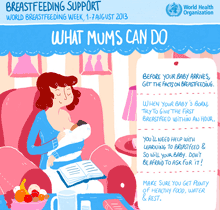 WHO remains firmly committed to protecting and promoting breastfeeding and supporting mothers to give their babies the best start in life.30 July 2013 – From 1 to 7 August 2013, more than 170 countries will celebrate World Breastfeeding Week under the theme of “Breastfeeding support: close to mothers”. Breastfeeding is the best source of nourishment for infants and young children and one of the most effective ways to ensure children’s optimal growth, development and health. The Week aims to encourage more mothers to breastfeed their children.
WHO remains firmly committed to protecting and promoting breastfeeding and supporting mothers to give their babies the best start in life.30 July 2013 – From 1 to 7 August 2013, more than 170 countries will celebrate World Breastfeeding Week under the theme of “Breastfeeding support: close to mothers”. Breastfeeding is the best source of nourishment for infants and young children and one of the most effective ways to ensure children’s optimal growth, development and health. The Week aims to encourage more mothers to breastfeed their children.
Optimal breastfeeding practices – early initiation and exclusive breastfeeding for 6 months and appropriate complementary feeding with continued breastfeeding up to 2 years or beyond – are among the most cost-effective interventions to protect children from common causes of death, including complications from prematurity, newborn infections, pneumonia and diarrhoea. They are among the key interventions to reduce under-5 mortality and accelerate progress towards achieving Millennium Development Goal (MDG) 4 at the core of the regional initiative on saving the lives of mothers and children.
People who were breastfed as babies are also less likely to be overweight or obese later in life. They may also be less prone to diabetes and perform better in intelligence tests. Despite this evidence, globally only an estimated 38% of infants are exclusively breastfed for six months.
In 1974, the twenty-seventh World Health Assembly urged Member States to review sales promotion activities on baby foods and to introduce appropriate remedial measures, including advertisement codes and legislation, where necessary, over concern that breast-milk substitutes were being marketed to mothers too aggressively. This led, in 1981, to agreement on the International Code of Marketing of Breast-milk Substitutes, and the adoption of several subsequent resolutions on the matter.
WHO and partners are calling for more support for breastfeeding mothers. Some women are discouraged from breastfeeding, and are misled into believing that they are giving their children a better start in life by buying commercial substitutes. Mothers are often inundated with incorrect and biased information both directly, through advertising, health claims, information packs and sales representatives, and indirectly through the public health system.
This year's theme stresses the importance of counselling, including peer counselling. Health facilities that support breastfeeding – by making trained breastfeeding counsellors available to new mothers – encourage higher rates of the practice. WHO has developed courses to train health workers to provide skilled support to breastfeeding mothers and help them overcome problems.
Related links
Counselling on infant and young child feeding: training materials
Regional initiative on saving the lives of mothers and children



